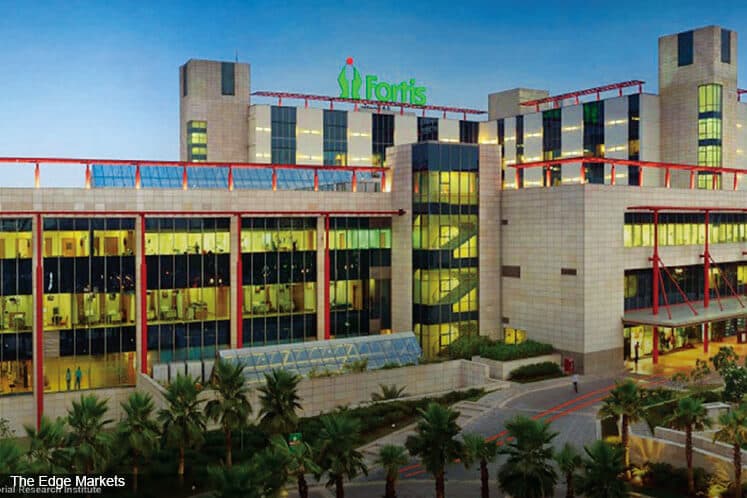
This article first appeared in The Edge Financial Daily on May 23, 2017
KUALA LUMPUR: IHH Healthcare Bhd has sold its entire 10.85% stake in India’s largest healthcare group, Apollo Hospitals Enterprise Ltd, but the group is not likely to exit India yet.
Reports have emerged that IHH may be one of the front runners to take up equity in India’s second-largest healthcare player Fortis Healthcare Ltd.
With a war chest of approximately RM1.26 billion after the divestment, IHH could expand in India, or as managing director Dr Tan See Leng referred to it, “IHH’s fourth growth market”.
Tan, however, declined to comment on Fortis.
“We do not normally comment on specific deals. We are always on the lookout for good acquisitions that are accretive,” Tan told a press conference yesterday after IHH’s annual general meeting.
India’s Economic Times reported that IHH was looking to acquire both Fortis and its smaller sister company, Fortis Malar Hospitals Ltd, from brothers Malvinder and Shivinder Singh.
IHH faces competition from a consortium consisting of TPG and General Atlantic.
On one hand, Fortis is substantially smaller than Apollo. It has a market capitalisation of 100.85 billion rupees (RM6.72 billion) compared with Apollo’s 175.44 billion rupees.
However, a key difference is that IHH may be able to take up a controlling stake in Fortis.
The Singh brothers are said to be selling the bulk of their 52.3% stake in the company and ceding management control — a massive sweetener for IHH if it does pursue the acquisition.
“It has always been part of IHH’s strategy to hold controlling stakes in its investments. Disposing of a non-controlling stake in Apollo to take a controlling stake in Fortis would be in line with that strategy,” Maybank Kim Eng investment analyst John Cheong told The Edge Financial Daily.
He sees the potential acquisition in a positive light. Fortis is a big group in India and would give IHH instant access to a much bigger market.
“IHH has always been in the premium segment and they have displayed good capability operating in India. They have almost turned around the two hospital groups they acquired. Fortis owns several prestigious healthcare facilities,” explained Cheong.
A Singapore-based equity research analyst at CIMB Securities Ltd, Jonathan Seow, pointed out that it is difficult to expand inorganically in India.
“If IHH wants to expand its healthcare business, it will have to be through brownfield rather than greenfield projects. We see that as the right strategy to use,” Seow said.
“We understand that IHH is open to accretive acquisitions. Depending on [the] price and if IHH can take a sizeable stake, it should be positive for the group,” he added.
On paper, a 30% stake in Fortis would cost about RM2 billion. As of March 31, IHH had RM2.77 billion in cash and a net gearing of only 20%. This did not include the RM1.2 billion from the disposal of its stake in Apollo — 6.07% disposed on March 3 and another 4.38% disposed on May 19.
Fortis currently operates about 4,000 beds with plans in the pipeline to grow that figure by about 7% to 10% each year. In contrast, Apollo operates over 10,000 beds.
It is worth noting that the Singh brothers may be under pressure to sell. It was reported that a whopping 85.6% of their Fortis shares are pledged.
Furthermore, the brothers are in the midst of a heated legal battle that could be squeezing them for cash. The brothers in 2008 sold their pharmaceutical company, Ranbaxy Laboratories Ltd, to Japan’s Daiichi Sankyo Co for US$4.6 billion. A few months later, the US Food and Drug Administration banned imports from Ranbaxy’s Indian plants. Ranbaxy would go on to plead guilty to adulterating drugs and pay a US$500 million fine.
Last year, the International Court of Arbitration in Singapore awarded Daiichi damages and interest of US$500 million, a sum that is forcing the brothers to divest their most prized asset.